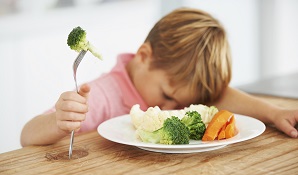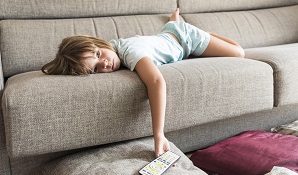Sometimes the best place you can turn to for childcare advice is your mum, or your gran, or even that wise old childless aunt who somehow knows a lot about raising children. However, as knowledgeable as these experts might be, you may find that a lot of what they tell you is based on outdated misconceptions or old wives’ tales. Since you don’t want to be starving a fever when you should be feeding the heck out of it, we’ve investigated the six most common myths about children’s health, and brought you the straight answers.
1. Starve a fever, feed a cold The myth: Let’s start with the one we’ve already mentioned. This guideline for caring for people afflicted with colds and flu is a piece of age-old medical folklore. It dates to when people thought that the digestive process could actually increase a fever. However, they believed that if you were ill with just a cold, you could still be fed back to health.
The truth: Restricting your intake of calories when you have a fever could in fact reduce the energy your body has for fighting off the illness. While some people might not have much of an appetite when they have a fever, it’s a good idea to keep them fed – even if you can only get them to take a thin broth or chicken soup.
2. Chicken soup is mum’s penicillin The myth: While we’re on the topic of chicken soup, does it really have the magical healing qualities that some people suggest? While chicken soup doesn’t actually have any antiviral or antibacterial properties, there is a lot that it can do for your children when they’re under the weather.
The truth: While it’s not actually fighting the infection, chicken soup certainly delivers some benefits. Hot fluid dilates the blood vessels in their sinuses, so it can help clear congestion, and the salt and water in soup prevent them from becoming dehydrated. And as we mentioned above, their bodies need energy to fight off viruses, so soup is helpful when they’re sick for that reason as well.
Getting cold is different from catching a cold
3. Don’t go outside with wet hair or you’ll catch your death! The myth: This is a favourite parental warning, and it’s stuck because no parent likes to see their children getting cold. But getting cold is different from catching a cold , and while wet hair may cause the former, it has very little to do with the latter.
The truth: Colds and flu are caused by viruses, which are passed on by contact with other people. We tend to get more of them in winter because we stay in enclosed spaces and are generally closer to other people in the colder months. Colds and flu are not caused by wet hair – kids may be uncomfortable, but they won’t get sick.
4. Don’t swim after eating. You could get a cramp and drown. No one knows quite how this myth came about, but it’s repeated like gospel down through the generations. Some people believe it was a myth of convenience, buying mothers an hour of downtime after lunch when they didn’t have to watch their children in the pool. The pseudoscientific claim is that digesting food pulls blood into the stomach, leaving the rest of the body prone to cramps or weakness.
The truth: There’s plenty of blood to go around the body, and while exercise after a meal can cause discomfort, there’s no direct link between food, and cramps and drowning. If your child wants to jump in the pool after a hotdog and plate of chips, let them. On the other hand, if you want a break after lunch, perpetuate the myth!
5. Don’t sit too close to the TV. You’ll go blind. The myth: This old wives’ tale is actually an old technology tale. In 1967, General Electric informed the public in the United States that they had made a factory error, and that the radiation being emitted from their televisions was 10 to 100 000 times the recommended level. They advised sitting a few feet away and not watching the TV for more than an hour until the defective sets could be replaced. The factory error has long since faded from memory, but General Electric’s advice hasn’t. As a result, parents today still beg their children to sit far away from their TV sets.
The truth: Modern TVs don’t emit the same kinds of radiation as the televisions in the 60s, so there’s no risk of radiation damage to your children’s eyeballs. Children also have a shorter focal length than adults, which means that they can sit much closer to the box than adults can without getting eye strain. In the rare instance that they do get sore or tired eyes as a result of watching any screen for too long, turning it off and getting some rest is the simple solution.
6. Eat your carrots – they’ll improve your eyesight.The myth: The origin of the “carrots improve your eyesight” myth was a World War II propaganda campaign that tried to convince Germany that English pilots were able to shoot them down because they had been eating an excess of the orange tubers and not because the Brits had developed a fancy new radar. No one knows if Germany believed this, but the message stuck and mothers everywhere encouraged their children gobble their carrots, “fast as bunnies”.
The truth: Carrots contain beta carotene, a substance that your body converts to Vitamin A, which is an important nutrient for supporting eye health. You can’t eat an abundance of carrots and throw your spectacles away, but you might just reduce the chances of your eyes becoming dry or developing cataracts – and you can get these benefits from mangoes and pumpkin as well.
Take it all with a pinch of salt Any piece of unsubstantiated kitchen wisdom handed down from mother to daughter (or father to son) should be treated with suspicion. Most of these old wives’ tales come from an era before scientific and medical progress and have little basis in fact. However, as with carrots and chicken soup, the tale may contain a grain of truth, so your best approach is to do your research before passing it on to the next generation – or risk becoming an old wife, yourself.




